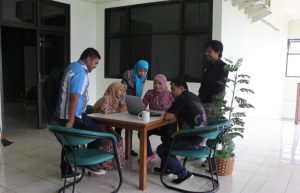1. Lecture Process
Epidemiology Masters Study Program lectures apply Problem Based Learning (PBL) and Student Center Learning (SCL), referring to the latest developments in science and technology with varied learning methods. In its implementation, there is interaction between lecturers and students in discussions so that they can achieve a conducive academic atmosphere.



2. Implementation of UTS and UAS
The requirement for students to take the exam is a minimum attendance of 75% of the total lecture. The implementation of the UTS and UAS is carried out on a scheduled basis in the form of class exams, team papers, presentations and take home exams.
3. Thesis Guidance
Thesis guidance is conducted by 2 supervisors whose implementation can be carried out from the writing of the proposal to the thesis examination. Guidance activities are carried out at least 5 times for each supervisor with proof of the signature of supervisor 1 and supervisor 2 on the thesis consultation card.

4. Execution of Proposal Exam, Seminar Result, Thesis Exam


5. Practicum Activities
Practical activities are implemented to support the teaching and learning process in the course of Public Health Laboratory 1 (second semester) and Public Health Laboratory 2 (third semester). The practicum was conducted at the Epidemiology Laboratory, Faculty of Public Health, Diponegoro University, Central Java Province Health Laboratory Center and Medical Device Testing Center and the Center for Research and Development of Disease Vector and Reservoir Health (B2P2VRP) in Salatiga.
6. Student Involvement in Research Activities and Community Service
This activity is included in the General Field Assignment course in third semester. In this activity, students are trained to make diagnoses on community health in certain areas.
Availability of Facilities and Infrastructure
1. Library
The Epidemiology Masters Study Program has provided various facilities and infrastructure that support the teaching and learning process. Among them is the availability of a library equipped with various reference books as well as free access to journals subscribed by the University.
 Picture. The situation at Library of Undip Post Graduate School
Picture. The situation at Library of Undip Post Graduate School
2. Reference Room
In addition, the Master of Epidemiology Study Program also provides reference rooms that support the ease of access to reference books and student journals as well as adequate discussion rooms. This discussion room facility is fully provided for 6 days (Monday-Saturday), but for 5 business days it is still limited to 08.00 am to 04.00 pm. Nevertheless, the student comting coordinator has been given the key responsibility to be able to open the room and use it if necessary.






Recent Comments